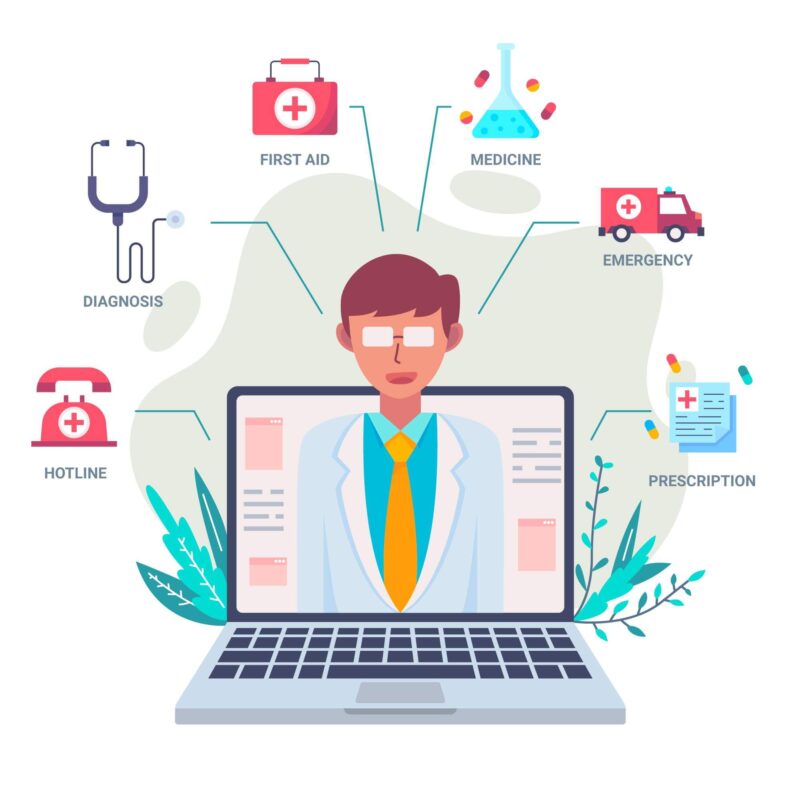Machines have automated all our daily tasks and business workflow. They build products for us, assist with online customer queries, and even drive our cars. In healthcare, the same machines, particularly AI systems, perform duties similar to that of a doctor.
These duties can be anywhere from recommending medicines to spotting diseases that might be hard for humans to detect in time. So, when artificial intelligence has simplified so many processes, why not let it help out healthcare professionals with tedious tasks like updating electronic health records (EHRs) and documenting patient disease?
Medical dictation software is how healthcare professionals can get help with their daily tasks. This software can be integrated to help convert spoken words into text, which reduces the need for manual data entry.
In this blog, we’ll help you find the best medical dictation software for your needs and demonstrate how the top software in this field speeds up healthcare processes.
What Is A Medical Dictation Software?
This software is specifically designed for healthcare professionals. It allows them to dictate their notes, reports, and other documentation into a microphone, and then the software converts those spoken words into text.
It is trained on a massive dataset of medical terminology, which helps to ensure that it accurately transcribes the complex medical language of doctors.
This technology is quicker and more efficient than typing or handwriting to create medical records. Most medical dictation software easily links with EHR integration systems, letting users dictate directly into their patients’ charts.
While this technology offers convenience, there have been worries about privacy and security, given the sensitive nature of medical information.
To address these concerns, medical dictation apps are now available that instantly recognize speech or securely transmit audio files to a speech recognition platform in compliance with HIPAA regulations.
Medical Dictation Software vs. Medical Transcription Software
Medical transcription software is another tool within the realm of dictation software, explicitly designed to transcribe spoken medical notes into written form. While both play crucial roles in creating medical records, they are distinct tools with different functionalities. Here’s a comparison of the two medical software:
| Medical Dictation Software | Medical Transcription Software |
| Allows healthcare professionals to dictate notes through a microphone. | Converts audio recordings from dictation software into written text documents. |
| Saves time compared to typing or handwriting notes. | Generates text documents suitable for electronic health record systems. |
| Improves accuracy by reducing errors. | Ensures high-quality written records with proper terminology and grammar. |
| Reduces fatigue and physical strain. | Faster turnaround time for complete medical records. |
| Examples: Dragon Medical One, M*Modal Fluency Direct | Examples: TranscribeMe, Nuance PowerScribe 360 |
Methods to Integrate Medical Dictation Software With an EHR System
EHR integration in medical dictation software is necessary for the smooth functioning of medical office productivity tools. There are three main methods to make it happen.
Direct Integration
Some dictation software can be seamlessly integrated or embedded within specific EHR systems. This means you can dictate and transcribe directly into the patient’s chart without switching between applications.
Plug-in Integration
Certain software has plug-ins or add-ons that connect to your existing EHR system. It allows you to dictate within the EHR interface, with transcribed text automatically filling in relevant sections of the patient’s record.
Cloud Integration
Cloud-based dictation software can be accessed through a web browser or app, enabling dictation from any device with an internet connection. These platforms often offer easy integration with various EHR systems through APIs.
Choosing the right method depends on compatibility, desired features, and security. Ensure that HIPAA-compliant processes are followed when integrating with EHR systems.
Benefits of Using A Medical Dictation Software with EHR Systems
Healthcare dictation tools offer a range of advantages for healthcare professionals, patients, and healthcare organizations. Here are some key benefits:
Faster Documentation:
Dictating notes is significantly faster than typing, allowing healthcare professionals to see more patients and reduce administrative burdens.
Improved Workflow:
It simplifies the documentation process by capturing information directly into the system. This eliminates the need to switch between applications.
Reduced Errors:
Doctors don’t need to worry about the risk of typos and misinterpretations that can occur with manual transcription, which leads to accurate and reliable medical records.
Consistent Terminology:
Speech-to-text software is easily customized to identify precise medical terminology, maintaining uniform and standardized documentation.
Increased Focus on Patients:
It allows healthcare professionals to spend more time interacting with patients and providing quality care rather than focusing on documentation.
Enhanced Patient Engagement:
Dictating notes in the presence of patients can foster better communication and understanding. Patients can also review their records in real-time to ensure accuracy.
How to Summarize Medical Records Quickly with A Transcription Software
11 Best Medical Dictation Software for EHR Integration
Selecting the best medical dictation software for EHR integration is essential for the healthcare industry. The right tool can simplify record-keeping, amplify patient care, and ensure compliance.
Here are the top 11 best medical dictation software to help you choose the most suitable medical documentation solutions you need:
1. Dragon Medical One
It is one of the sought-after cloud-based solutions renowned for its high-accuracy speech recognition and customizable templates. Users can simply use it with popular EHR systems like Epic, Cerner, and EMR.
Advantages
- Offers flexibility and accessibility from any device with an internet connection.
- Renowned for its reliable speech recognition and reduced errors.
Disadvantages
- Subscription-based pricing might be a consideration for individual users or smaller practices.
- May require initial training to adjust to voice recognition and dictation techniques.
2. M*Modal Fluency Direct
It turns speech into text in real-time with incredible accuracy, perfect for medical terms. Accessible on the mobile app for convenient dictation. Plus, it comes with features like workflow tools and voice commands to make your work smoother.
Advantages
- Reduces wait times and accelerates document processing.
- Facilitates easy dictation while on the move, boosting flexibility.
Disadvantages
- Similar to Dragon Medical One, subscription fees might be a factor.
- Compared to some options, customization options might be more restricted.
3. Nuance PowerScribe
This solution is an industry standard known for its reliable accuracy and vast medical vocabulary. It includes speaker identification functionality along with reporting tools.
Advantages
- Handles complex medical terminology with ease, reducing errors.
- Differentiates between multiple speakers in recordings, improving clarity.
Disadvantages
- Subscription fees might be a barrier for some users or practices.
- This may require initial training for optimal utilization of all features.
4. Dictation Genie
One of the affordable cloud-based in the voice recognition software market. It has a variety of options with strong accuracy and a user-friendly interface.
Advantages
- A cost-effective option compared to some competitors, making it accessible
- Simplifies learning and adoption, reducing onboarding time and potential frustrations.
Disadvantages
- Compared to more comprehensive solutions, it might lack advanced functionalities.
- Confirm compatibility with your EHR system to ensure smooth integration.
5. SayIt by nVoq
This is a web-based dictation software designed to improve productivity and reduce costs. It is known for its HIPAA-compliance software.
Advantages
- Has HIPAA compliance to ensure data security and patient privacy adherence.
- Provide Multilingual support and cater to diverse healthcare environments.
Disadvantages
- Subscription fees might be a factor to consider, depending on usage and budget.
- As with any new software, there might be an initial learning curve for users.
6. MediSapien
It is an advanced medical speech recognition solution that makes use of artificial intelligence to interpret spoken language accurately. Its powerful text editing tools enable quick and efficient document creation.
Advantages
- Offers robust tools for efficient document creation and refinement.
- Enables personalization of workflows and features to suit individual preferences.
Disadvantages
- May require specific hardware specifications for optimal performance.
- Depending on your EHR system, integration might require technical expertise.
7. TranscribeMe
This platform uses a hybrid technology of human transcriptionists and AI to provide accurate, quick turnaround times. It also offers EHR integration and customizable templates.
Advantages
- Combines human expertise with AI for high accuracy and fast turnaround times.
- Allows for standardization and efficiency in documentation practices.
Disadvantages
- Pricing might be higher compared to some purely AI-based solutions.
- Potential delays if human review or intervention is required for complex cases.
8. ChartNet Speech Recognition
With an extensive medical vocabulary and high accuracy rates, this software is a popular choice for healthcare professionals.
Advantages
- Handles complex medical terminology effectively, reducing errors.
- Delivers reliable speech recognition, improving documentation quality.
Disadvantages
- Availability of detailed features and functionality specifics might be restricted.
- Verify compatibility with your EHR system before implementation.
9. SpeechExec
This is a powerful solution that supports Windows, iOS, and Android devices. It comes with various features like voice recognition, file management, and transcription to improve efficiency.
Advantages
- Delivers reliable speech recognition, improving documentation quality.
- Widely used in healthcare, potentially indicating familiarity and ease of use.
Disadvantages
- The availability of detailed features and functionality specifics might be restricted.
- While potentially cost-effective, pricing information might not be readily available.
10. FreeDictation
This free app is perfect for small practices or individual healthcare professionals looking for a simple, cost-effective dictation solution. It offers basic speech recognition and automatic transcription.
Advantages
- Supports Windows, iOS, and Android devices, offering flexibility and convenience.
- Allows for personalization of settings and workflows to suit individual needs.
Disadvantages
- Subscription fees might be a factor, depending on chosen features and usage.
- As with any comprehensive software, there might be an initial learning curve.
11. Converse Smartly®
Converse Smartly is a smart solution for medical dictation designed to simplify the documentation process for healthcare professionals. Folio3 uses the latest speech recognition technology to provide a preeminent online speech recognition tool for the best and most accurate results.
Advantages
- AI and machine learning algorithms accurately transcribe medical dictations in real time.
- Enhances transcription with key features: identifies keywords, auto-summarizes, detects speakers, and analyzes sentiment.
Disadvantages
- Depending on the pricing and your usage, it could be pricier than other options.
- The software may lack detailed customization for tailoring transcriptions to specific needs.
Overcoming Common Challenges in Implementing Medical Transcription Software
Choosing the Right Medical Dictation Software
The best medical dictation software for EHR integration depends on your specific needs and preferences. Consider factors like accuracy, features, ease of use, integration capabilities, and pricing when making your decision.
With the variety of options available, it can be challenging to choose the right medical dictation software for EHR integration. Here are some helpful tips to remember:
- Evaluate accuracy rates and specialized medical terminology recognition capabilities.
- Consider your desired features and workflows.
- Look into pricing plans and potential subscription fees.
- Check compatibility with your specific EHR system.
- Consider data security measures and compliance with regulations.
To make it easier for you to choose the best medical dictation software, here’s a quick comparison of the 11 best software we discussed in this blog:
Software |
Features |
Benefits |
Drawbacks |
Pricing |
| Dragon Medical One | Cloud-based, High accuracy, Customizable templates | Flexible, Reliable, Speech recognition | Initial training required | Subscription-based |
| M*Modal Fluency Direct | Real-time speech-to-text, Workflow tools, Voice commands | Reduces wait times, Mobile dictation, Smooth workflow | Limited customization | Subscription-based |
| Nuance PowerScribe | Industry-standard, Reliable accuracy, Reporting tools | Reliable, Handles complex terms, Differentiates speakers | Initial training required | Subscription-based |
| Dictation Genie | Affordable, Cloud-based, User-friendly interface | Cost-effective, Easy to learn, Reduces onboarding time | Limited advanced functionalities
|
Subscription-based |
| SayIt by nVoq | Web-based,
HIPAA-compliant, Multilingual support |
Secure, Caters to diverse environments | Initial learning curve | Subscription-based |
| MediSapien | AI-powered speech recognition, Powerful text, Editing tools | Efficient document creation, Customizable workflows | Specific hardware requirements | Not readily available |
| TranscribeMe | Hybrid AI and human transcription, Fast turnaround, EHR integration | High accuracy, Fast
Turnaround, Standardized documentation |
Higher pricing compared to some AI solutions | Varies based on volume and turnaround |
| ChartNet Speech Recognition | Extensive medical vocabulary, High accuracy | Handles complex terms, Improves documentation quality | Limited information on features and functionality | Not readily available |
| SpeechExec | Supports multiple devices, Voice recognition, File management | Reliable speech recognition, Widely used | Pricing might not be readily available | Not readily available |
| FreeDictation | Free, Basic speech recognition, Automatic transcription | Cost-effective, Flexible, Customizable | Limited features, Potential learning curve | Subscription-based |
| Converse Smartly® | AI-powered, Keyword identification, Sentiment analysis | High accuracy, Differentiates speakers,
Protects sensitive information |
Limited customization, Requires internet connection | Not readily available |
Conclusion
Medical dictation software is changing the game in healthcare documentation, bringing a ton of benefits. It ramps up productivity by 30-50% in record keeping, giving professionals more time for patient care.
Plus, it wipes out errors and keeps terms consistent. With tools like Converse Smartly®, Dragon Medical One, M*Modal Fluency Direct, and Nuance PowerScribe, healthcare professionals can deliver results with better efficiency and care.
However, each tool has its own advantages and disadvantages. It’s essential to evaluate your specific needs and preferences before choosing the best medical dictation software for EHR integration.
Frequently Asked Questions (FAQs)
What Is Medical Dictation Software?
Medical dictation software is a voice recognition technology that permits healthcare professionals to dictate patient notes, diagnoses, and treatment plans.
How Does Medical Dictation Software Integrate With EHR Systems?
It integrates with EHR systems by granting users the ability to dictate directly into patient records and assemble healthcare data management.
What Are the Benefits of Using Medical Dictation Software in Healthcare?
Doctors have the most benefits as they can record multiple individual diagnoses simultaneously, which speeds up treatment and helps save millions of lives.
How Do I Choose the Best Medical Dictation Software for My Practice?
Choosing the best medical dictation software involves considering factors like accurate disease analysis results and compatibility with EHR systems.
Is Medical Dictation Software HIPAA-Compliant?
Yes, medical dictation software is HIPAA-compliant because it implements encryption to make sure the personal information of patients is secure.

Dawood is a digital marketing pro and AI/ML enthusiast. His blogs on Folio3 AI are a blend of marketing and tech brilliance. Dawood’s knack for making AI engaging for users sets his content apart, offering a unique and insightful take on the dynamic intersection of marketing and cutting-edge technology.










